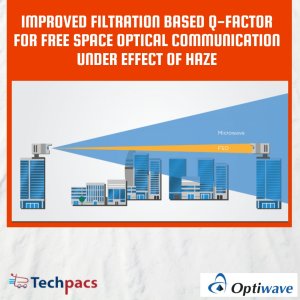Maximizing Data Reliability: Optimizing MZM Modulator Encoding Schemes for Four-Channel FSO Communication
Problem Definition
The existing literature on Free Space Optical (FSO) communication systems highlights various modulation schemes proposed by researchers to combat attenuation issues. However, these methods suffer from limitations that hinder their overall performance. One major drawback is the limited data carrying capacity of conventional models, which negatively impacts their efficiency. Additionally, the speed of data transmission between locations poses a significant challenge that needs to be addressed for optimal system performance. Moreover, the impact of varying weather conditions on FSO efficiency cannot be overlooked, as existing models struggle to maintain data transmission over long distances under different weather scenarios.
These factors collectively contribute to an increased Bit Error Rate (BER) and system complexity, underscoring the need for a novel modulation scheme that can alleviate these limitations and enhance overall system efficiency.
Objective
The objective of the proposed work is to develop a new modulation scheme for Free-Space Optical (FSO) communication systems that can enhance performance under adverse weather conditions. This includes introducing Spectrum Slicing WDM with 4 channels for heavy rain weather and an extended 8-16 channels WDM system for fog, haze, and rain weather conditions. By integrating advanced modulation schemes such as DQPSK and Manchester, the goal is to reduce complexity, error ratio, and improve efficiency in FSO communication systems. The project aims to analyze different encoding schemes, simulate the Mach-Zehnder modulator in FSO systems, and design an effective MZM-based encoding scheme for a 4-channel FSO system. Additionally, the impact of rain attenuation on FSO communication for different seasons will be studied to optimize signal transmission and reception.
Ultimately, the objective is to enhance Inter-Satellite Optical Wireless Communication systems and contribute to the advancement of FSO technology.
Proposed Work
In order to address the research gap identified in the literature survey, the proposed work aims to develop a new modulation scheme for Free-Space Optical (FSO) communication systems that will enhance performance under adverse weather conditions. By introducing Spectrum Slicing WDM with 4 channels focusing on heavy rain weather, and an extended 8-16 channels WDM system tailored for fog, haze, and rain weather conditions, the goal is to improve the transmission efficiency of data. The integration of advanced modulation schemes such as DQPSK and Manchester will further enhance the system's overall performance. The rationale behind these choices is to reduce complexity, error ratio, and improve efficiency in FSO communication systems.
The project's approach involves developing a model for analyzing different encoding schemes and implementing an effective transmission model for spectrum sliced WDM in FSO communication.
By simulating the Mach-Zehnder modulator in FSO systems, the goal is to improve the system's efficiency under varying weather conditions affected by rain attenuation. Unlike traditional models that use NRZ encoding schemes, this work will explore other encoding schemes that may perform better in FSO communication. Specifically, the focus will be on designing an effective MZM-based encoding scheme for a 4-channel FSO system. Additionally, the impact of rain attenuation on FSO communication for different seasons will be analyzed to optimize the transmission and reception of signals. Through these efforts, the proposed work aims to enhance Inter-Satellite Optical Wireless Communication systems and contribute to the advancement of FSO technology.
Application Area for Industry
This project can be applied in various industrial sectors such as telecommunications, defense, disaster management, and data centers. In the telecommunications sector, the proposed modulation scheme can help in improving the data carrying capacity and efficiency of Free-Space Optical (FSO) communication systems, leading to faster and more reliable data transmission. In the defense sector, the project can address the challenge of transmitting data over longer distances under different weather conditions, enhancing communication capabilities in critical situations. For disaster management, the improved FSO system can provide a robust communication network that is less susceptible to weather interference, ensuring constant connectivity during emergency situations. In data centers, the enhanced modulation scheme can help in achieving higher data transfer speeds and reducing the complexity and error ratio of FSO systems, leading to improved performance and efficiency.
Overall, implementing the proposed solutions can result in increased reliability, speed, and effectiveness of communication systems across various industrial domains.
Application Area for Academics
The proposed project aims to enrich academic research, education, and training in the field of Free-Space Optical (FSO) communication systems. By developing a new and effective modulation scheme for FSO systems, the project addresses the limitations of existing models, such as limited data carrying capacity, slow data transmission speed, and decreased efficiency under varying weather conditions.
Through the analysis of different encoding schemes, including NRZ, DQPSK, and Manchester, the project aims to improve the overall performance of FSO systems by reducing complexity and error rates while increasing efficiency. The simulation of a Mach-Zehnder modulator in FSO systems will provide insights into the behavior of different encoding schemes and their impact on system performance.
Researchers, MTech students, and PhD scholars in the field of optical communication can benefit from the code and literature generated by this project.
By exploring the effectiveness of different encoding schemes in FSO systems, researchers can develop innovative research methods, simulations, and data analysis techniques. MTech students can use the project's findings to enhance their understanding of FSO systems and explore potential applications in their academic projects. PhD scholars can leverage the project's research outcomes to advance their research in the field of optical communication.
The project's relevance extends to the broader domain of optical communication technology, with potential applications in other related fields. Future research can build upon the proposed work by investigating additional encoding schemes, optimizing system parameters, and developing advanced signal processing techniques for FSO communication systems.
By fostering collaboration and knowledge sharing, the project contributes to the advancement of academic research and education in the field of optical communication.
Algorithms Used
DQPSK, NRZ, and Manchester are the three algorithms used in the project for analyzing various encoding schemes and implementing an effective transmission model for spectrum sliced WDM in FSO communication. Each algorithm plays a specific role in the project - DQPSK is utilized to improve the efficiency of the FSO system under different seasons affected by rain attenuation, NRZ encoding scheme is traditionally used with MZM modulator for data transmission over the FSO system, and Manchester encoding scheme is considered alongside NRZ and DQPSK for comparison and analysis. The project aims to design an effective MZM-based encoding scheme for a 4-channel FSO system by conducting simulations and studying the behavior of different encoding schemes in FSO communication. The analysis also includes the impact of rain attenuation in FSO communication for four different seasons to determine the best transmission and reception of signals in FSO communication.
Keywords
SEO-optimized keywords: modulation schemes, attenuation, FSO, data transmission, weather conditions, BER, complexity, spectrum slicing WDM, Mach-Zehnder modulator, encoding schemes, NRZ, DQPSK, Manchester, rain attenuation, optical communication systems, signal processing, communication technologies, weather effects, communication reliability, optical networking, satellite communication systems, communication efficiency, system performance, performance evaluation, power, adverse weather conditions, heavy rain weather, fog, haze.
SEO Tags
FSO Communication, Free Space Optics, Attenuation in FSO, Modulation Schemes, Mach-Zehnder Modulator, Spectrum Sliced WDM, NRZ Encoding Scheme, DQPSK, Manchester Encoding, Inter-Satellite Optical Wireless Communication, Weather Effects on FSO, Bit Error Rate (BER), Communication Efficiency, Optical Signal Processing, Communication Reliability, Satellite Communication Systems, Research Scholar, PHD Student, MTech Student, Communication Technologies, Performance Evaluation, Optical Networking.
| Shipping Cost |
|
No reviews found!

















































No comments found for this product. Be the first to comment!